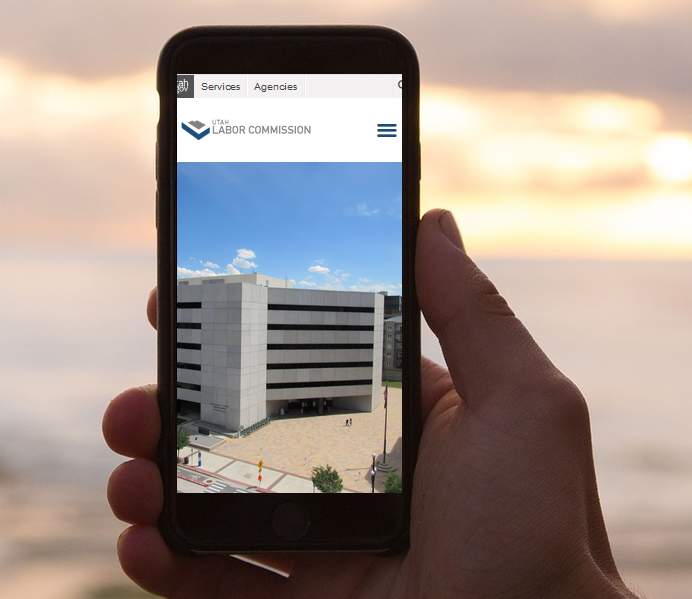Injured Workers
About Us
The primary objective of the claims intake section of the Industrial Accidents Division is to educate, and assist in resolving disputes that may arise during the workers’ compensation claim process, and ensure timely and accurate claim reporting.
Questions or Concerns?
If you are an injured employee and have questions or concerns related to a work place injury or illness, please complete this online form and a claims specialist will contact you.
Employee's Guide to Workers’ Compensation
Employees are entitled to workers’ compensation benefits for work injuries and illnesses even if an employee has only been on the job a short time or only working part-time.
Reporting a Work Injury or Illness
An injured employee should report an injury or illness to their employer immediately.
Workers' Compensation Benefits
Depending on specific circumstances, workers’ compensation can pay one or more of the following benefits.
Medical Treatment
An employer or their insurance carrier may require an injured employee to be initially treated by a preferred medical provider.
Records Request
A request for workers’ compensation records for yourself or an individual must be submitted with the Form 205.
Family Medical Leave Act (FMLA)
FMLA does not distinguish between injuries that are work related and those that are not.
Coverage for Volunteers
A volunteer for a non-government entity is not an employee of the non-government entity for purposes of Chapter 3, Utah Occupational Disease Act.
Dispute Resolution
If an injured employee’s claim is denied, it is recommended that the employee speak with the claims adjuster.
Employer Unlawful Interference
It is against Utah Law for an employer to “impede or diminish an employee’s efforts to make a claim or receive worker’s compensation benefits.”
Questions or Concerns?
Do you have questions or concerns related to a work
place injury or illness?


Eligibility for Workers' Compensation Insurance
- Protection for employees by the workers’ compensation system begins as soon as an employee begins work with an employer. Employees are entitled to workers’ compensation benefits for work injuries and illnesses even if an employee has only been on the job a short time or only working part-time.
- Workers’ compensation is a no-fault system. However, workers’ compensation does not cover intentional self-inflicted injuries. Disability compensation may be denied for injuries from alcohol or drug abuse. Disability compensation can also be reduced by 15% for willful failure to use safety devices or follow safety rules.
- Under Utah law, a fraudulent workers’ compensation claim for compensation or medical benefits is a crime and any employee found guilty of fraudulently receiving these benefits is subject to fines and incarceration
Reporting a Work Injury or Illness
An injured employee should report an injury or illness to their employer immediately. It is the responsibility of the employee to report the injury to a physician, supervisor, manager, human resources, or any individual or department that should receive the report of injury. If the employee is not able to report the injury directly, next of kin can report on their behalf. It is important to ensure the report of an injury or illness is documented. If an injured employee fails to report an injury or illness within 180 days, they may be disqualified from receiving workers’ compensation benefits.
Once an injury or illness has been reported to the employer, the employer has 7 days to report the claim to its insurance carrier and the insurance carrier has 14 days to report the “First Report of Injury” (Form 122) to the Industrial Accidents Division. The employer and its insurance carrier must provide a copy of the report to the injured worker. When a copy of the Form 122 is provided to the injured worker, a copy of the “Injured Workers’ Rights and Responsibilities” (Form 100) should also be sent to the injured worker.
A doctor treating an injured employee is required to complete a “Physician’s Initial Report of Injury or Illness” (Form 123) and submit the report to the Industrial Accidents Division within 7 days of the initial visit. An injured employee should explain to the treating doctor HOW, WHEN and WHERE the injury or illness occurred. The injured employee can request a copy of the Form 123 from the medical provider.
The insurance carrier will open a claim for benefits once they have received either one or both reports from the employer or doctor. The insurance carrier is to make a determination of compensability of the injury or illness within 21 days of having received the claim for benefits. If further investigation is necessary, the insurance carrier or self-insured employer has an additional 24 days to accept or deny your claim.



Workers' Compensation Benefits
Medical
Medical care expenses that are reasonable and necessary to treat an employee’s injury or illness. This includes visits to a treating doctor, hospital bills, medicine and prosthetic devices. It also includes reimbursement for the cost of mileage to travel to receive medical treatment. Medical benefits are considered a lifetime benefit as long as the medical treatment is necessary to continue to address a work related injury or illness.
Indemnity
When a worker is injured, each missed day of work represents lost wages. In workers’ compensation insurance, indemnity benefits are paid to the employee to help them cover their loss of income. Payments are a portion of the worker’s average weekly wage, and take into consideration the extent of the disability.
Temporary Partial Disability Compensation is paid to an injured employee when the work injury or illness prevents them from earning their full regular wage while recovering. For example, if the injured employee works fewer hours or works at a light-duty job that pays less than their regular job, they are entitled to temporary partial disability compensation in addition to their earned wages.
Temporary Total Disability Compensation is paid to an injured employee if they are unable to do any work because of the injury or illness. No compensation is paid for the first 3 days after an injury or illness unless the disability prevents an employee from working for more than a total of 14 days. In that case, the employee will be paid for the first 3 days of disability. This type of compensation ends when the injured employee returns to work or has reached medical stability. An injured employee can receive temporary total disability compensation until they can return to regular work, the employer offers suitable light-duty work, or the injured employee has reached medical stability. The maximum duration for temporary total disability compensation is 312 weeks within a 12 year period of time from the date of injury.
Permanent Partial Disability Compensation is paid if the injured employee’s work injury or illness leaves them with a permanent impairment. This compensation begins when the doctor determines the employee has reached medical stability; this compensation is determined according to an impairment rating provided by an authorized physician.
Permanent Total Disability Compensation is paid if the injured employee’s work-related injury or illness leaves them with a permanent disability that prevents them from returning to their former work or performing any other work that is reasonably available to them.
Dependent Benefits and Funeral Benefits in case of a work related fatality.
Death
When the death of an employee is the result of a work-related injury or illness, weekly dependent compensation is paid by the self-insured employer or insurance carrier to the surviving spouse and/or dependents.
If an employee dies from a work injury or illness, workers’ compensation will pay up to a certain amount for funeral and burial expenses.
The insurance carrier or self-insured employer may request that the dependent(s) supply copies of marriage, death, and/or birth certificates, and also relevant divorce decrees as part of the claim filing.
For more information regarding dependent death benefits and burial benefits, please contact the Industrial Accidents Division at (801) 530-6800.
Medical Treatment
An employer or their insurance carrier may require an injured employee to be initially treated by a preferred medical provider. After the initial visit to the preferred provider, an employee may choose to make a one-time change of medical providers during the course of their claim, however they must ensure the medical provider accepts workers’ compensation insurance. An injured employee must also immediately inform the insurance carrier or self-insured employer of the one-time change of medical provider. A referral from one medical provider to another is not considered a change of medical providers.
Because medical records are necessary to evaluate and administer workers’ compensation claims, workers’ compensation insurance carriers and claims administrators of self-insured employers are generally entitled to 10 years of past medical records (Form 307 and Form 308). An employer is not entitled to these records.

Records Request
The Industrial Accidents Division has a copy of your or an individual Industrial Accident records. A request for workers’ compensation records for yourself or an individual must be submitted with the Form 205. Request for Copies from the Industrial Accidents Division, along with proper authorization and necessary documentation in order to process the request.
The Division of Industrial Accidents of the Utah Labor Commission (Division) will research workers’ compensation records only after necessary authorization to gather the records is received. Utah Labor Commission (Commission) workers’ compensation records are classified as “private” per the Government Records Access and Management ACT (GRAMA), Utah Code Ann. §63G-2-101 et seq. Commission records are not subject to the Health Insurance Portability and Accountability Act (HIPAA) rules. Under GRAMA, the Division has up to 10 working days to respond to records requests.
The Industrial Accidents records do not contain a copy of your medical records. Medical records are used/stored by the insurance carrier responsible for the claim or the doctor(s) that are involved in your care. Medical records can be requested by contacting your doctor’s office.
Form 205 – Authorization to Release Industrial Accidents Records is the form to request Industrial Accident Records, it contains all the necessary information and must be signed and notarized. Other release forms may be used but must contain the required information and be notarized. All release forms must be dated and notarized no more than 90 days before the date of the request. Record requested by the claimant for the claimants use are free of charge ONE time, any request made after will have a fee.
Along with the notarized records request release, a fee of $15.00 must be received before a records search is conducted. After the records are collected, Form 203 – Records Request Response will be returned to the requester with the copy charge of $0.25 per document. Certified copies of documents are $2.00 per certification using our own certification. The total fee amount must be paid before documents are mailed.
If you have any questions, or would like to obtain a copy of your records, please contact the Records Department at (801) 530-6844.


Family Medical Leave Act (FMLA)
The Workers’ Compensation Act does not require employers to continue paying for health insurance while an injured employee is off work and receiving workers’ compensation benefits. An employee should talk to their employer about the Family and Medical Leave Act (FMLA), 29 CFR 825 to see if it applies to them.
FMLA applies to all public agencies, including local, State and Federal employers, and local education agencies (schools); and Private sector employers who employ 50 or more employees for at least 20 work weeks in the current or preceding calendar year (including joined employers and successors of covered employers.)
FMLA does not distinguish between injuries that are work related and those that are not. FMLA leave and workers’ compensation leave can run together, provided the reason for the absence is due to a qualifying serious illness or injury and the employer properly notifies the employee in writing that the leave will be counted as FMLA leave.
For additional questions related to FMLA please visit: www.dol.gov/whd/fmla/ or call the U.S. Department of Labor, Wage and Hour Division, Salt Lake City District Office at (866) 487-9243.
Coverage for Volunteers
A volunteer for a non-government entity is not an employee of the non-government entity for purposes of Chapter 3, Utah Occupational Disease Act, unless the non-government entity elects to provide workers’ compensation insurance coverage. A non-government entity may elect to secure coverage for all of the non-government entity’s volunteers by obtaining coverage for the volunteers in accordance with Utah Code Ann. §34A-2-201 under the same policy it uses to cover the non-government entity’s employees. A volunteer for a government entity, is entitled to workers’ compensation medical benefits; and in some cases, disability compensation benefits.



Dispute Resolution
If an injured employee’s claim is denied, it is recommended that the employee speak with the claims adjuster to inquire why it was denied and if there is any additional information that can be submitted to resolve the problem.
If the insurance carrier continues to deny the claim, an injured employee can contact the Industrial Accidents Division for assistance through the Intake Claims Department. If the efforts on behalf of the Industrial Accidents Division claims staff does not resolve the dispute, and the employee believes they are entitled to benefits, they can file an Application for Hearing with the Labor Commission’s Adjudication Division.
If an injured employee determines to file an Application for Hearing, they may also request to participate in a Claims Resolution Conference.
A Claims Resolution Conference is offered by the Adjudication Division to assist in resolving workers’ compensation disputes between an injured employee and a self-insured employer or insurance carrier.
The Industrial Accidents Division staff can explain an employee’s rights under the Utah Workers’ Compensation Act, however they cannot offer legal advice nor legally represent an employee.
For more information regarding how to file an Application for Hearing please contact the Adjudication Division at (801) 530-6800.
Unlawful Interference
An employer may not engage in behavior towards an employee in which they are intimidated, coerced, or harassed with the intent of preventing the employee from making a workers’ compensation claim or receive benefits.
It is against Utah Law for an employer to “impede or diminish an employee’s efforts to make a claim or receive worker’s compensation benefits,” Utah Code Ann. §34A-2-114. Employers found to unlawfully interfere with an employee’s workers’ compensation claim are subject to fines of up to $5,000.
For more information about Unlawful Interference or to report non-compliance on behalf of an employer please contact (801) 530-6800 or send us a message.

Questions or Concerns?
If you are an injured employee and have questions or concerns related to a work place injury or illness, please complete this online form and a claims specialist will contact you.
